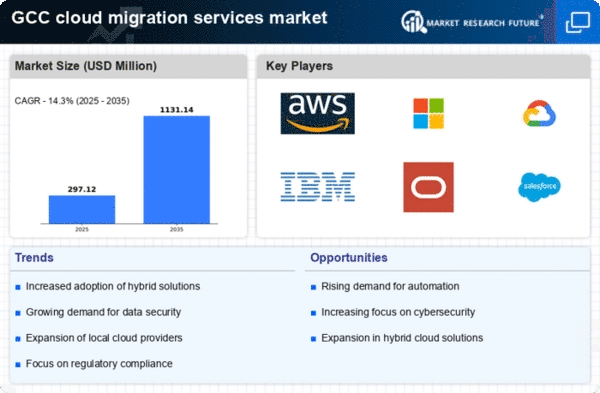Emphasis on Cost Management
Cost management remains a critical driver in the cloud migration-services market, particularly as organizations in the GCC seek to optimize their IT expenditures. The transition to cloud services often presents opportunities for cost savings through reduced infrastructure investments and operational efficiencies. Businesses are increasingly aware that cloud migration can lead to a reduction in total cost of ownership (TCO) by as much as 25%. This financial incentive is compelling organizations to explore cloud migration services as a means to streamline their operations and allocate resources more effectively. As companies prioritize cost management, the cloud migration-services market is likely to experience sustained growth, driven by the need for organizations to achieve financial prudence while enhancing their technological capabilities.
Rising Demand for Scalability
The cloud migration-services market is experiencing a notable surge in demand for scalability solutions. Organizations in the GCC are increasingly recognizing the need to scale their IT resources dynamically to meet fluctuating business requirements. This trend is driven by the rapid growth of digital services and the necessity for businesses to adapt quickly to market changes. According to recent data, the cloud services market in the GCC is projected to grow at a CAGR of 20% through 2026, indicating a robust appetite for scalable cloud solutions. As companies migrate to the cloud, they seek services that allow them to expand or contract their resources seamlessly, thereby enhancing operational efficiency and responsiveness. This rising demand for scalability is a key driver in the cloud migration-services market, as it enables organizations to optimize their IT infrastructure while minimizing costs.
Government Initiatives and Support
Government initiatives in the GCC are playing a pivotal role in shaping the cloud migration-services market. Various national strategies aim to promote digital transformation across sectors, encouraging businesses to adopt cloud technologies. For instance, the UAE's Vision 2021 and Saudi Arabia's Vision 2030 emphasize the importance of cloud computing in enhancing economic diversification and innovation. These initiatives often include financial incentives, regulatory support, and the establishment of cloud service hubs, which collectively foster a conducive environment for cloud adoption. As a result, organizations are increasingly turning to cloud migration services to align with government mandates and leverage available resources. This supportive regulatory landscape is likely to propel the growth of the cloud migration-services market, as businesses seek to comply with national strategies while enhancing their operational capabilities.
Increased Focus on Business Continuity
The cloud migration-services market is witnessing a heightened emphasis on business continuity planning. Organizations in the GCC are increasingly aware of the need to ensure uninterrupted operations in the face of potential disruptions. Cloud migration services offer robust solutions for data backup, disaster recovery, and operational resilience, which are critical for maintaining business continuity. Recent studies indicate that companies that have migrated to the cloud report a 30% improvement in their ability to recover from disruptions. This focus on business continuity is driving organizations to invest in cloud migration services, as they seek to safeguard their operations against unforeseen events. Consequently, the demand for reliable cloud solutions is expected to grow, further propelling the cloud migration-services market as businesses prioritize resilience and operational stability.
Growing Adoption of Advanced Technologies
The cloud migration-services market is being significantly influenced by the growing adoption of advanced technologies such as artificial intelligence (AI), machine learning (ML), and the Internet of Things (IoT). Organizations in the GCC are increasingly integrating these technologies into their operations, necessitating a shift to cloud-based platforms that can support their data processing and analytical needs. The cloud provides the necessary infrastructure to harness the power of AI and ML, enabling businesses to derive actionable insights from vast amounts of data. As a result, the demand for cloud migration services is likely to increase, as companies seek to leverage these advanced technologies to enhance their competitive edge. This trend indicates a transformative shift in the cloud migration-services market, as organizations recognize the potential of cloud solutions to drive innovation and efficiency.

















